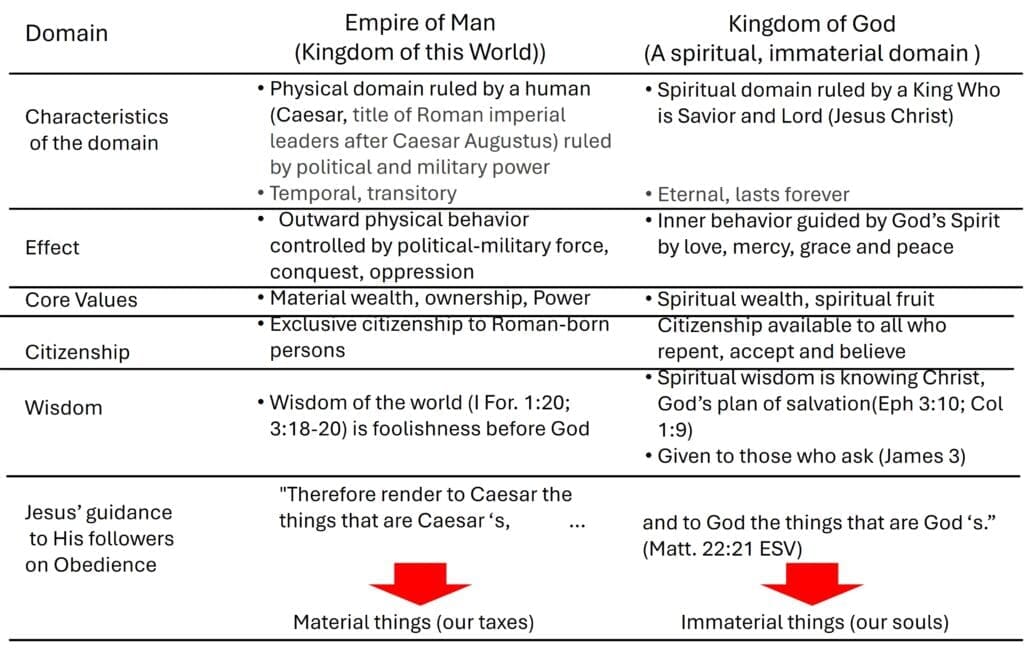Wisdom Wednesday: Wisdom of Two Kingdoms
Submitted by Debbie’s Dad
Jesus answered, “My kingdom is not of this world. If My kingdom were of this world, then My servants would be fighting so that I would not be handed over to the Jews; but as it is, My kingdom is not of this realm.” (John 18:36 NASB 1995)
In this passage, Jesus was responding when He was brought before Pilate for judgment. The Jewish leadership of the day arrested Jesus and Pilate asked Jesus “What have you done?” Jesus replied by explaining that He has a kingdom that is not of (a part of) this world. (18:35) This caused Pilate to then exclaim, “Then you are a king!” (18:37) Of course, this would interest Pilate, who was on guard against any potential threat to the Roman empire.
Jesus responded by simply explained that He came to bring truth (the correct explanation of spiritual reality) to the world. (18:37) Consistent with His teachings throughout His ministry, He provided the Light to reveal the truth of God and the way to have a relationship with Him. This truth revealed a kingdom – God’s kingdom in the spiritual domain. And Jesus is the King.
This theme of 2 kingdoms distinguishes the empires of mankind and the kingdom of God that Jesus described. The chart below contrasts these two kingdoms, one temporal, one eternal: one is material, and one is immaterial. And both have their own form of wisdom.

In Jesus’ day, the kingdom of Man was represented by the Roman Empire and it was ruled by a man (a Caesar). It ruled by power, conquest and law.
On one occasion, Jesus was being challenged by two opposing groups that sought to trick Him. Together, they created a sharply devised question, “…Is it lawful to pay taxes or not?” (Matthew 18:15-17):
- The Heroians were a political party of Jews supporting Herod and the Roman government. Non-religious, they opposed Jesus’ spiritual teachings and his potential to challenge the Roman government status quo. They wanted Jesus to answer, “no”, that it is not right to pay taxes to Caesar – this would clearly disobey the Roman Law.
- The Pharisees were the Jewish strict religious group that required outward obedience to the Law of Moses and ordinances but had been chastised by Jesus for their failure to be genuinely spiritual and righteous in trusting God. (see Matthew 23:24). They wanted Jesus to answer, “yes”, it is right to pay Roman taxes and thus place Caesar over the Mosaic Law.
These people thought Jesus would be trapped! But Jesus provided a wise answer by distinguishing between two kingdoms – man’s kingdom (or domain) and God’s. He simply replied:
But Jesus perceived their malice, and said, “Why are you testing Me, you hypocrites? Show Me the coin used for the poll-tax.” And they brought Him a denarius. And He said to them, “Whose likeness and inscription is this?” They said to Him, “Caesar’s.” Then He said to them, “Then render to Caesar the things that are Caesar’s; and to God the things that are God’s.” And hearing this, they were amazed, and leaving Him, they went away. (Matt 22:18–22).
He distinguished between two kingdoms—and answered, effectively, “Yes and No”
There is a wisdom of the kingdom of Man (called the “wisdom of the world” by Paul ( I Corinthians 3:19) and there is a wisdom of God that is pure, then peaceable, gentle, reasonable, full of mercy and good fruits, unwavering, without hypocrisy (James 3:7).
Let us render to God our lives to serve Him in the Kingdom of God, ask for His wisdom to live a life that is pure, peaceable, gentle, reasonable, full of mercy and good fruits, unwavering, and without hypocrisy.y